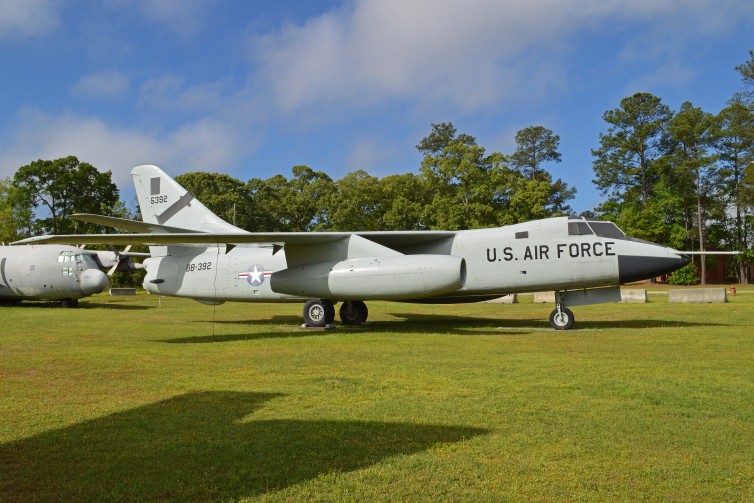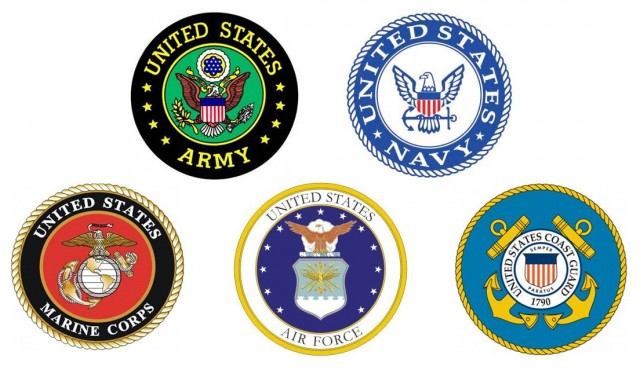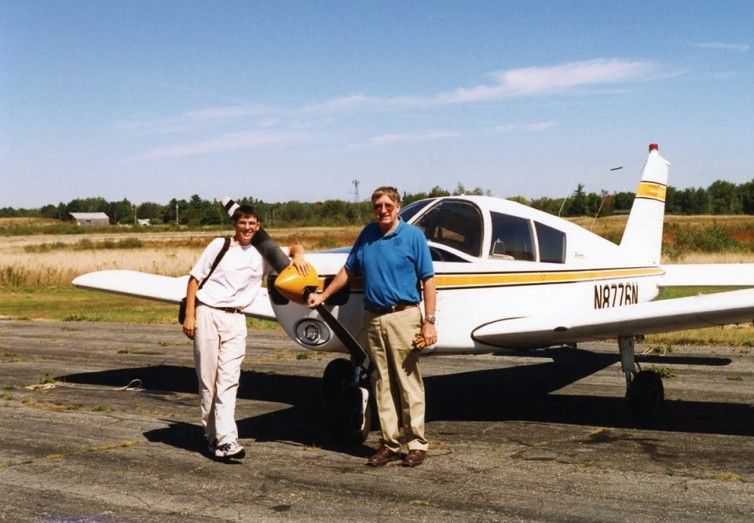
Author (L) and Ed Sleeper (R) on the author’s solo flight on his 16th birthday – Photo: Linwood Lothrop
Veterans Day in the United States is a time where we as a country pause to remember those who have served in the armed forces. There are many of us in the aviation enthusiast community who got into the hobby because of their service in, or interaction with, the military. I’d like to share with you the story of a remarkable man who was an accomplished military and civilian aviator; United States Air Force Colonel Edward B. Sleeper (Ret.).
I’ll spare you the long story about how I came to meet Ed and be involved in his exploits, and just tell you a bit about him. I’ll throw in a few of the exploits as a bonus. He would’ve wanted it that way.
Ed entered Air Force aviation cadet training in 1956, graduating as a navigator. He saw service in this role in the B-66 and B-52. He eventually entered pilot training in 1964, and was assigned to the C-130. He flew several combat missions in Vietnam. Later assignments placed him around the world in numerous positions and during all of this, he helped raise a family and completed a masters degree.
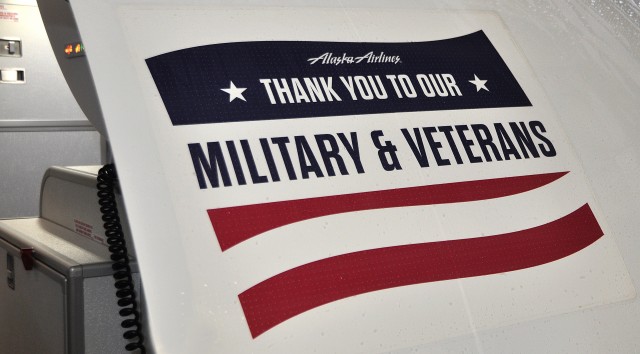
Special sign on the outside of Alaska Airline’s first Boeing 737-900ER. Image from Alaska.
For my “real” job I am a Career Counselor at a local state university. One of the things I enjoy most about my job is helping veterans transition from the military and college life to the working world. In December I will be presenting at a conference on hiring veterans and highlighting companies that are doing some pretty cool things with veterans. One of those companies is Alaska Airlines (I love when my world’s collide). To celebrate Veteran’s Day this year, Alaska has shared a story, that I wanted to repeat on the blog. To all of those who have served, are serving or are planning to serve — I thank you and hope to be able to assist you in your future career aspirations. Here is Alaska’s story:
In the days leading up to Veteran’s Day, Horizon Air Captain Lawrence Pavlinovic has a number of people to thank, gratitude to express and wisdom to pass along to his two sons. Born to immigrant parents, Pavlinovic not only understands the concept of freedom, he fights for it, and works for a company that generously supports his efforts.
Pavlinovic has worked as a pilot for Horizon Air since 1998, and since that time has experienced several military deployments lasting from one to two years. Each time he’s returned to Horizon, his job was waiting for him.
“It’s hard to describe how that feels, to know that your job will be there when you return from active duty,” says Pavlinovic, who is a Lt. Colonel in the Army Reserves, working in logistics and specializing as a linguist. “I can serve my country without worrying whether I will have to look for a job when I return home. When you serve in a hostile region, you need to be very focused on your work, and not whether your employer back home may hire somebody else for your job.”
BONUS: More on Alaska Airlines, veterans and fallen soldiers
Greg Smith, Alaska Airlines project manager with the Project Management Office, recently returned from three weeks of military training. He is grateful that his colleagues filled in while he was away, and thankful to a company that supports his efforts by keeping his job open for him. During his last deployment to Afghanistan, Smith, who worked for Verizon Communications at the time, returned stateside to discover his job was gone when the telecommunications giant sold off certain segments of the company. “My job was basically eliminated,” says Smith, an Army Reserves major working in Afghanistan as a logistician. “It’s very stressful when that happens, and it happens more often than you know.”
Under the Uniform Services Employment and Reemployment Rights Act, reservists and National Guard members who are called to leave their jobs to perform active duty are given rights to re-employment in their civilian jobs, according to Laura Harlos, Alaska Air Group’s manager of compliance and diversity programs. Additionally, employees returning from active duty are entitled to all rights, benefits and seniority they would have received had they never left.
Surprisingly, despite the law, some employers are less enthusiastic about employees leaving to serve their country, according to the Employer Support of the Guard and Reserve (ESGR). Some employers look for ways to circumvent the law, or find loopholes. Companies can downsize, lay off employees or sell the business to another company and returning soldiers often fall through the cracks.
Not at Alaska Air Group. The company has won several awards from the ESGR in the past few years for supporting employees deployed to war or to training.
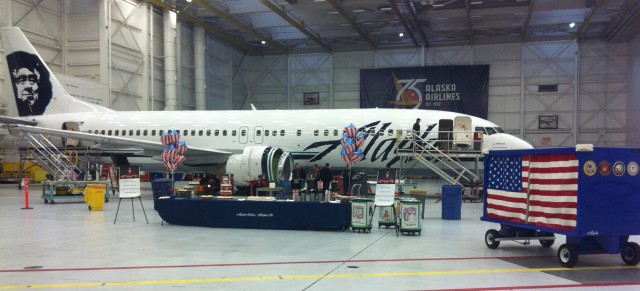
iPhone photo I was able to take of an Alaska Airlines Boeing 737 and the fallen soldier baggage cart at the airline’s maintenance facility in Seattle during a special Veteran’s event in November 2011.
“We value their service we don’t consider it a burden, we consider it a valuable asset,” says Scott Lautman, Alaska Air Group’s human resources manager for maintenance, engineering and safety. “Along with the Alaska Spirit, enthusiastic support of our reservists has become part of our DNA.”
For Pavlinovic, the Air Group’s support of his military service comes to mind when he talks to his sons, age 14 and 17, about how fortunate they are to be Americans. A proud Croatian American, Pavlinovic’s parents came from Croatia and Pavlinovic, who was born in Seattle, spent many years living with his grandparents in the “old country.”
“I want my boys to understand how fortunate they are to have opportunities, to have the support of a country and to have freedom,” says Pavlinovic. “Many in the world don’t have that freedom and some who have it take it for granted. Not at my house.”
Pavlinovic joined the military to pay back his country for giving his parents a home and giving his father the opportunity to work to support his family. His father worked for Pan Am at the ticket counter at Seattle-Tacoma International Airport for many years, and Pavlinovic always wanted to be a pilot. Wearing corrective lenses, the Seattle native could not be a pilot in the military, so he became a linguist instead. He saved his money and paid for flying lessons so he could become a commercial pilot.
In January of 2010, Pavlinovic was deployed to England to work for the Joint Analysis Center for European Command. He worked closely with LaMar Haugaard, chief pilot for Horizon Air, to schedule the time off, and upon return, to enroll in ground school for any updates he might have missed. Pavlinovic returned to Horizon in October of 2011.
“I can’t thank the company enough for their support,” Pavlinovic says. “I really missed flying and when I contacted Horizon to tell them my deployment was finished, they said to come on home.”
Both Pavlinovic and Smith say there are certain observances throughout the year when a thank you doesn’t seem adequate.
“Fourth of July, Memorial Day and Veteran’s Day those are the times when you reflect on what you are doing, and those around you that support what you are doing,” says Smith. “It’s a time when I stand a little taller, and allow myself to feel pride熔f my service, of my employer and of my country.”

